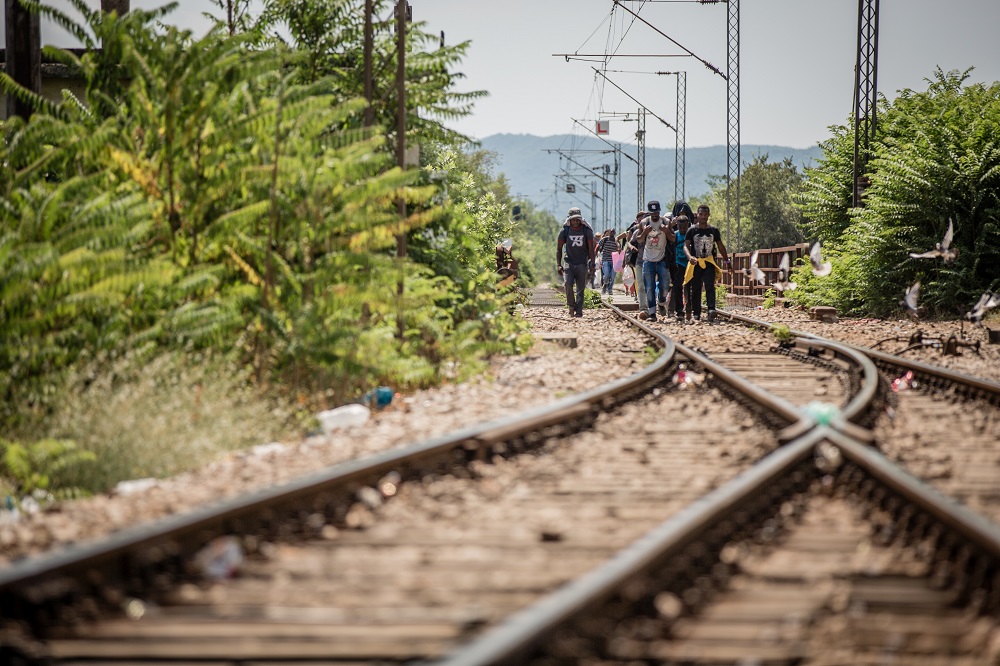Migration to the EU: a perilous and difficult journey
Brussels, 17 December 2015 - Limited access to basic services, arbitrary detention, violence and abuse, losing touch with loved ones, or facing possible death: these are some of the risks that migrants face on their way to the EU.

© Stephen Ryan / IFRC
Most of the migrants arriving on our shores have been through a long and traumatic journey to reach safety in the EU. The limited opportunities for safe and legal migration drive many migrants to resort to the services of smugglers, embarking on dangerous sea or land voyages.
"Three or four times, I’ve been in situations where I thought ‘this is it. I’m going to die,’ said Hazarat Khan Khpal Waak when he arrived in Europe from Afghanistan.
Ahead of International Migrants Day, National Red Cross Societies in the EU call on the EU and its Member States to focus on the factors that exacerbate the vulnerabilities of migrants during their journeys and to develop measures to reduce these risks.
Our position paper on addressing the vulnerabilities linked to migratory routes to the European Union puts forward the following set of concrete steps and recommendations that should be applied as a matter of priority:
- Implement an effective framework for safe and legal migration to the EU.
- Develop mechanisms for identifying and addressing the additional vulnerabilities of migrants linked to their migratory routes.
- Respect and protect the rights of all migrants – irrespective of their legal status – in domestic and foreign policies.
- Facilitate family reunification and address the legal, practical and/or administrative obstacles which limit or prevent family unity.
- Uphold a victim-centred approach in all efforts to tackle human trafficking.
- Set up a dedicated search and rescue operation covering the entire Mediterranean Basin, and support assistance to migrants in distress.
- Uphold the right of migrants and their families to know about the fate of their loved ones.
This position paper is based on our booklet Perilous journeys – Vulnerabilities along migratory routes to the EU which features migrants’ testimonies and experiences throughout their journeys. It builds on the practical expertise of Red Cross and Red Crescent National Societies working with and for all migrants on both sides of the Mediterranean.
We believe that recent policy initiatives, such as the Valletta Summit on Migration, overlook some of the very specific, and often invisible difficulties that migrants face on their way to the EU. "Migrants are victims of significant abuse at all stages of the migratory process,” said Denis Haveaux, Director of the Red Cross EU Office. "Understanding the diversity and complexity of each migrant’s vulnerabilities is fundamental to developing and implementing humane, effective and sustainable responses,” he stressed.
The risks that migrants are exposed to during their journeys increase their vulnerabilities, often causing severe physical and psychological distress which exasperates previous trauma suffered in countries of origin. Importantly, the ways in which migrants’ individual vulnerabilities are recognised or ignored upon arrival in their destination countries greatly affect their wellbeing and integration. We therefore urge the EU and its Member States to adapt their policies and procedures in consideration of the dynamics that render some migrant groups more vulnerable, including those resulting from their migratory journeys to reach the EU.
For further information, please contact:
Eva Oyon, Communications Officer, Red Cross EU Office,
+32(0)2 235 09 22, eva.oyon@redcross.eu
For media inquiries, please contact Eva Oyón on: eva.oyon@redcross.eu or +32 2 235 09 22

